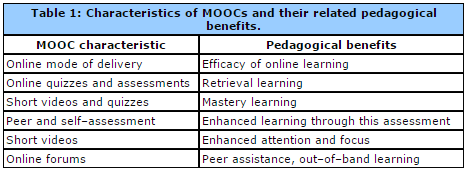Massive Open Online Courses, known under the widely used acronym MOOCs, have taken the modern education world by storm, offering a wide variety of options for students worldwide. Their greatest advantage is, of course, the fact they are provided for free or at low prices, which is why both people with no official education and those with a university degree are readily embracing the opportunities.
Clearly, the rapid rise in the number of platforms that provide such courses is mostly due to the advancements in web technologies. However, it is students’ motivation for constant improvement that keeps pushing the boundaries in the field. The fact that these courses are well thought-out and easy to follow additionally makes them an excellent resource for anyone willing to improve their career prospects.
Pedagogical base Of MOOCs
Even though recent reports suggest that online learning will hardly ever replace traditional educational settings, MOOCs certainly represent an efficient learning method since their pedagogy is developed in accordance with the needs of modern learners. Furthermore, given the fact they are mostly created by renowned educators, it is unsurprising that their design follows the highest educational standards.
In relation to the pedagogy of MOOCs, Glance, Forsey and Riley give an excellent table that explains some of their key benefits. Namely, the authors represent different correlations between common features of MOOCs and specific pedagogical benefits these features lead to:
The paper further examines each of these aspects in more detail, concluding that MOOCs’ mode of delivery is essentially grounded in pedagogy of somewhat more traditional learning environments, which is a feature that speaks a lot about their efficiency. Evidently, such courses include multiple benefits for modern learners and create an ecosystem that largely contributes to personal and professional development.
Who takes MOOCs
Although it may be logical to assume that people with no other educational opportunities would be most likely to engage in open online courses, research shows that this is not the case. Somewhat surprisingly, the largest portion of online course-takers is comprised of current employees that already have a college diploma.
Namely, a study by the University of Pennsylvania showed that 83% of current online learners already posses a two-year or four-year degree and that most of them have a stable job. Obviously, the groups of highly skilled staff seek to improve their professional skills, most notably those in programming and foreign languages, which seem to be the most popular online courses. Such trends may be attributed to the emergence of the global market, where there is a great demand for IT skills and where proficiency in foreign languages is certainly obligatory.
Considering these reports, it seems that MOOCs are valued more among life-long learners and current professionals than by those who have no higher education whatsoever. In relation to this, Brandon Alcorn, project manager for global initiatives at Penn, notes that students are “using it as a job-training tool rather than an educational tool,” which clearly illustrates their dominant purpose.
Top MOOCs' platforms
The pilots in the MOOC arena such as Coursera and EdX are still among the most popular platforms that count thousands of course-takers and hundreds of different courses. Their greatest advantage is probably the fact that they offer courses designed by educators from prestigious universities, thus making high quality education available to worldwide communities. Even though these two still seem to dominate the industry, there are multiple other websites and platforms that aim to specialize for specific areas.
Among other similar platforms, Udemy and Udacity have seen a rapid rise over the last few years, with more and more students turning to them for high quality courses. As opposed to many other platforms, these two offer courses designed by professionals currently working in their respective industries. Another interesting institution is Australian Upskilled that also offers both online and traditional courses that are specifically designed for modern Australian workforce to equip them with skills necessary for career advancement. Furthermore, the institution provides courses funded by the government to encourage development in specific areas, which is a great example of nationally-oriented strategy for improving education outcomes.
Conclusion
Considering the growing variety of education and professional training options available online, modern students and life-long learners certainly have a range of opportunities to improve their career prospects. The highest education standards, constant availability, as well as the convenient course design make MOOCs a favorite choice of global professionals.


